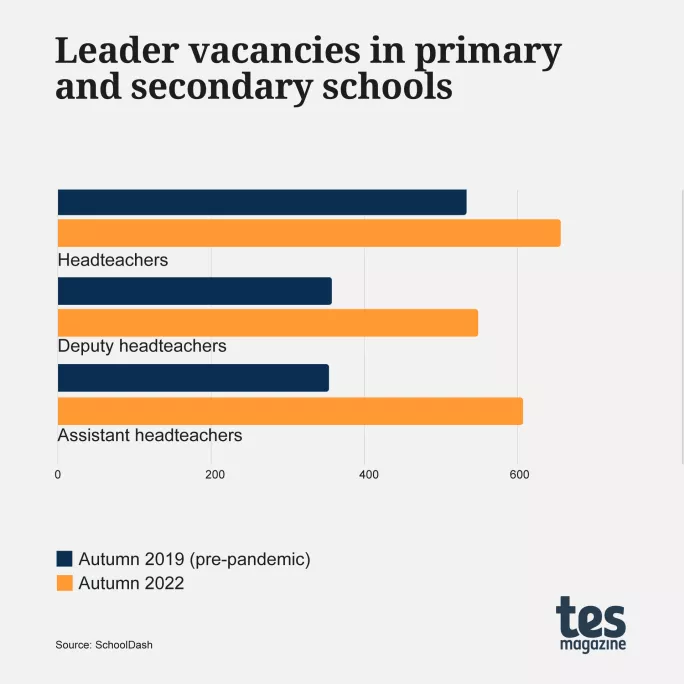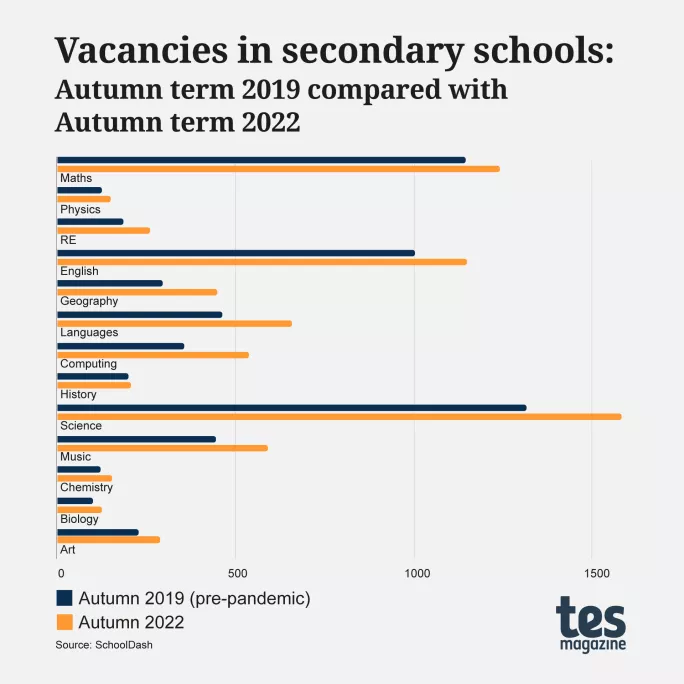Assistant head vacancies soar by 72%

The number of assistant headteacher vacancies has soared by 72 per cent compared with pre-pandemic levels, amid warnings that the system could be “asking too much” of school leaders.
And the number of deputy headteacher and headteacher vacancies rose by 53 per cent and 23 per cent respectively last term, compared with the same period in 2019-20, according to TeachVac data analysed by Tes.
Education leaders cite the growing pressures of the job, compounded by the pandemic, as a reason for the apparent hesitation in moving into senior leadership.

Vic Goddard, CEO of Passmores Cooperative Learning Community, a multi-academy trust in Essex, said he was surprised by the figures, describing assistant and deputy head positions as having been “the plum jobs in education for years”.
He said the only reasons this could have changed would be that “the money isn’t that different and the extra grief that comes with it” and the “sense of responsibility”.
Why the increase in school leadership vacancies?
Referring to the current teacher and school leader strike ballots over pay, he said: “Jobs get filled if the conditions and the pay are right.
“I think, as an industry, we need to reflect on, ‘Are we asking too much of senior leaders?’”
James Bowen, director of policy for the NAHT school leaders’ union, told Tes it would seem logical that the reason why assistant headships have the highest vacancy number would be that the position is the ”first step into senior leadership”.
This step up is “quite a significant jump”, he said.
- Exclusive: Headteacher vacancies nearly a fifth higher than pre-Covid
- Revealed: Soaring teacher vacancies impact on schools
- Teacher training: DfE raises teacher training bursaries amid recruitment crisis
Mr Bowen added that it “might be something there about people questioning, ‘Do I want the pressure of whole-school leadership?’, and assistant head being that first step into it”.
In November, a report from the NAHT warned that England’s education system was “haemorrhaging school leaders at an unprecedented rate, and leadership aspiration is collapsing”.
It also revealed that almost half of middle leaders who had left their post were also recorded as having left the profession.
Mr Bowen said: ”I think the worry is that this isn’t just a short-term blip.”
“I’m not sure I’d go as far as saying [it is] the new norm, but even if this extends for two, three, four, five years, that creates problems,” he added. “If we carry on seeing the kind of attrition rates we’re seeing...and that continues to be the case for the foreseeable future, then that creates all sorts of problems.”
The NAHT is currently balloting its members on whether they back strike action and whether they support action short of a strike, with the vote set to close on Wednesday.
Dame Alison Peacock, chief executive of the Chartered College of Teaching, told Tes that the position of assistant headteacher is a “kind of precursor towards looking at deputy headship or, ultimately, headship”.
She said her “gut feeling” about the high vacancies “is that it’s to do with pressure”.
“There is pressure throughout the system; that leadership roles, in particular, are seen increasingly as ‘you perform or you’re out’,” Dame Alison said.
She added: “I think for many teachers it feels like quite a thankless task to lead their organisation and it may well be that people are just looking at the experience they see amongst the senior staff within their school and just thinking, ‘This is not for me.’”
Dame Alison said there is also high attrition among experienced leaders.
”I’m certainly hearing from people who have been really established heads who are leaving before their time, who were just saying ‘enough is enough’,” she said.
John Howson, chair of TeachVac, which provided the data on vacancies, said the high vacancy numbers for assistant heads could also be due to an effort by schools to attract more middle leaders to high-cost areas - and to more assistant heads either being promoted or leaving their jobs for other roles.
Teacher vacancies remain high
Tes analysis also reveals that the number of vacancies for teachers and leaders is up by over half in some subjects compared with pre-pandemic levels, with vacancies overall 28 per cent higher.

Computing and geography are the worst-hit subjects, with vacancy levels for these subjects both up by 51 per cent in the autumn term this year, compared with the same period in the 2019-20 academic year, according to SchoolDash data analysed by Tes.
And languages and religious education vacancies were also high last term, with a 41 per cent and 40 per cent higher level of vacancies than pre-pandemic, according to analysis.
A Department for Education spokesperson said: “The overall picture of school leadership in England is positive - vacancy rates are low and the quality of leadership is high, but we do recognise school leaders have faced challenges.
“That is why we are taking a wide range of action to support the profession, including committing to the delivery of 500,000 teacher training and development opportunities by 2024, and funding a support scheme specifically for leaders.
“We are making the highest pay awards in a generation - 5 per cent for experienced teachers and more for those early in their careers, including an up to 8.9 per cent increase to starting salary.”
You need a Tes subscription to read this article
Subscribe now to read this article and get other subscriber-only content:
- Unlimited access to all Tes magazine content
- Exclusive subscriber-only stories
- Award-winning email newsletters
Already a subscriber? Log in
You need a subscription to read this article
Subscribe now to read this article and get other subscriber-only content, including:
- Unlimited access to all Tes magazine content
- Exclusive subscriber-only stories
- Award-winning email newsletters
topics in this article



